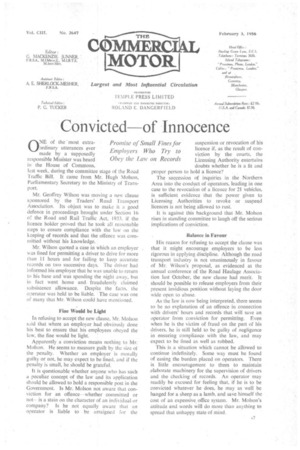Convicted of Innocence
Page 9

If you've noticed an error in this article please click here to report it so we can fix it.
ONE of the most extraprdinary utterances ever made by a supposedly responsible Minister was heard in the House of Commons, last week, during the committee stage of the Road Traffic Bill. It came from Mr. Hugh Molson, Parliamentary Secretary to the Ministry of Transport.
Mr. Geoffrey Wilson was moving a new clause sponsored by the Traders' Road Transport Association. Its object was to make it a good defence in proceedings brought under Section 16 of the Road and Rail Traffic Act, 1933. if the licence holder proved that he took all reasonable steps to ensure compliance with the law on the keeping of records and that the offence was committed without his knowledge.
Mr. Wilson quoted a case in which an employer was fined for permitting a driver to drive for more than 11 hours and for failing to keep accurate records on two successive days. The driver had informed his employer that he was unable to return to his base and was spending the night away, but in fact went home and fraudulently claimed subsistence allowance. Despite the facts. the operator was held to be liable. The case was one of many that Mr. Wilson could have mentioned.
Fine Would be Light In refusing to accept the new clause, Mr. Molson said that where an employer had obviously done his best to ensure that his employees obeyed the law, the fine would be light.
Apparently a conviction means nothing to Mr.' Molson. He seems to measure guilt by the size of the penalty. Whether an employer is morally guilty or not, he may expect to be fined, and if the penalty is small, he should be grateful.
It is questionable whether anyone who has such a peculiar concept of the law and its application should be allowed to hold a responsible post in the Government. Is Mr. Molson not aware that conviction for an offence—whether committed or not-is a stain on the character of an individual or company? Is he not equally aware that an operator is liable to be arraigned for the suspension or revocation of his licence if, as the result of conviction by the courts, the Licensing Authority entertains doubts whether he is a fit and proper person to hold a licence?
The succession of inquiries in the Northern Area into the conduct of operators, leading in one case to the revocation of a licence for 21 vehicles, is sufficient evidence that the power given to Licensing Authorities to revoke or suspend licences is not being allowed to rust.
It is against this background that Mr. Molson rises in standing committee to laugh off the serious implications of conviction.
Balance in Favour His reason for refusing to accept the clause was that it might encourage employers to be less rigorous in applying discipline. Although the road transport industry is not unanimously in favour of Mr. Wilson's proposal, as evidenced at the annual conference of the Road Haulage Association last October, the new clause had merit. It should be possible to release employers from their present invidious position without laying the door wide open to abuse.
As the Taw is now being interpreted, there seems to be no explanation of an offence in connection with drivers' hours and records that will save an operator from conviction for permitting. Even when he is the victim of fraud on the part of his drivers, he is still held to be guilty of negligence in ensuring compliance with the law, and may expect to be fined as well as robbed.
This is a situation which cannot be allowed to continue indefinitely. Some way must be found of easing the burden placed on operators. There is little encouragement to them to maintain elaborate machinery for the supervision of drivers and the checking of records. An operator may readily be excused for feeling that, if he is to be convicted whatever he does, he may as well be hanged for a sheep as a lamb, and save himself the cost of an expensive_ office system. Mr. Molson's attitude and words will do more than anything to spread that unhappy state of mind.




















































